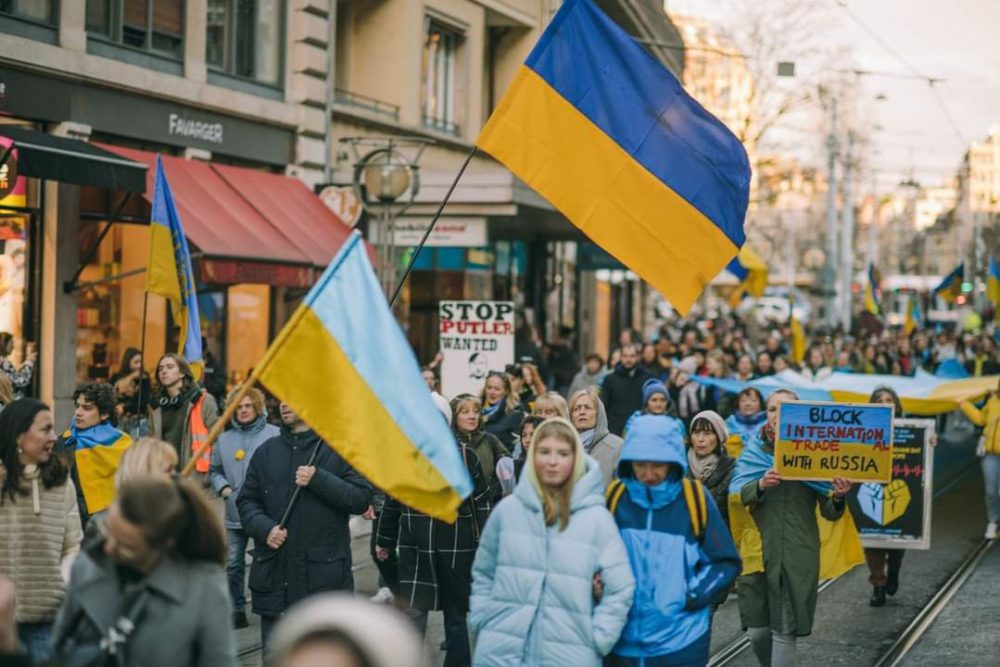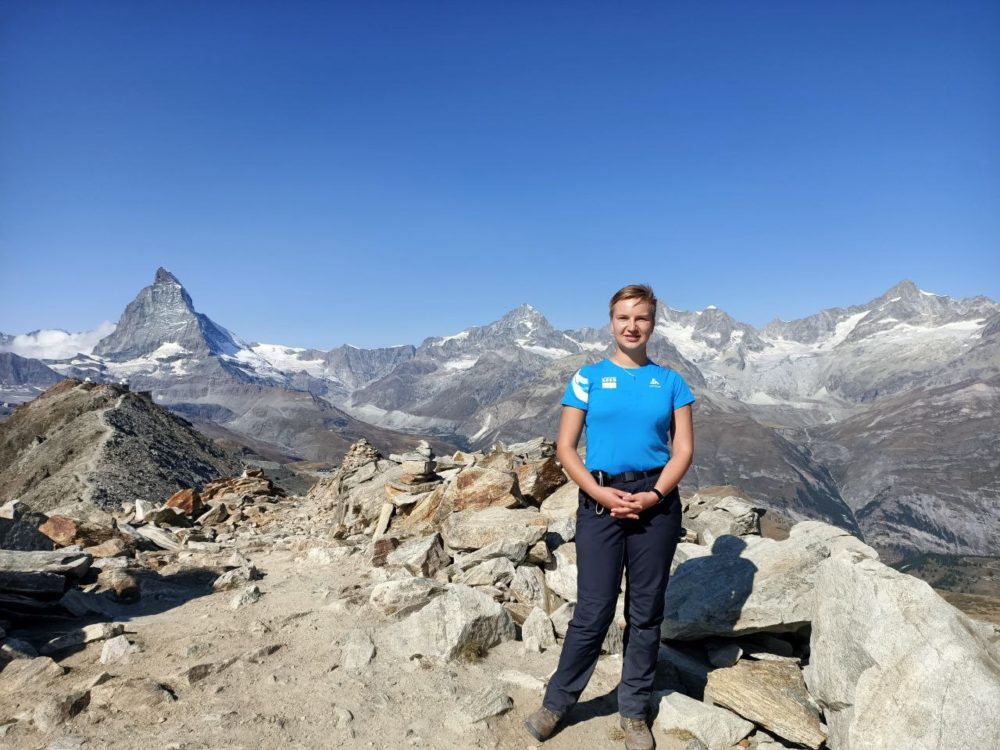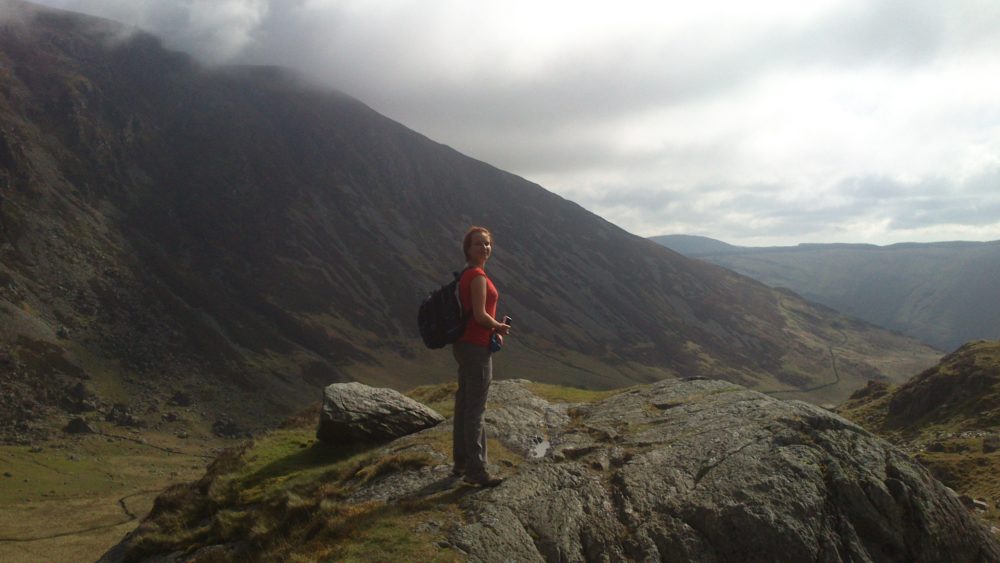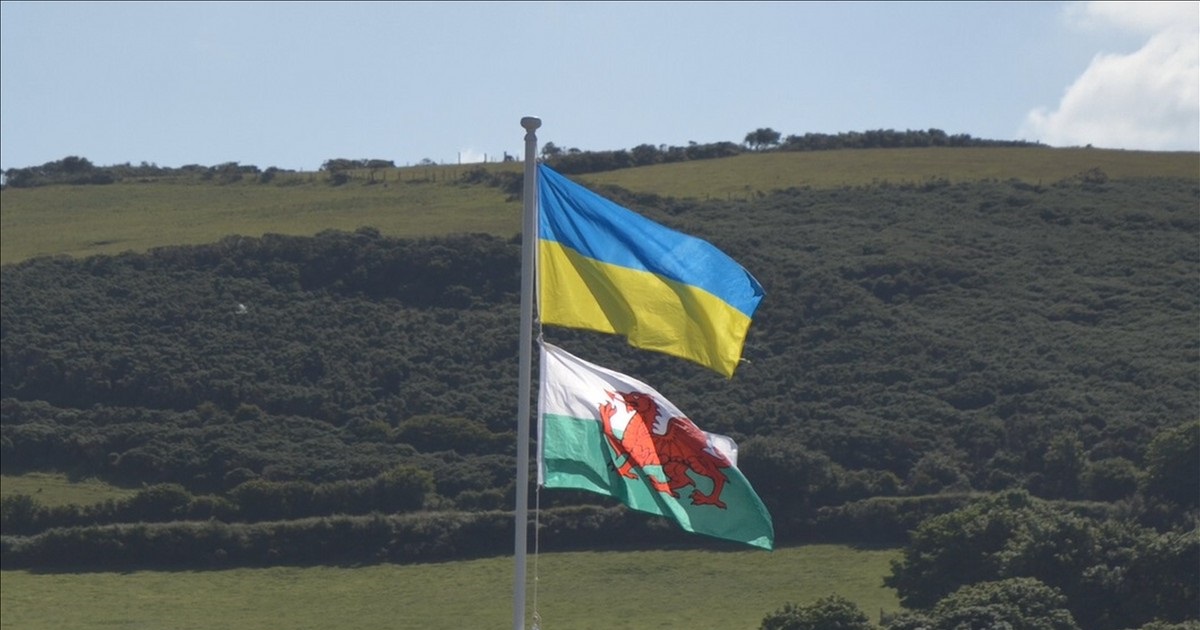Oleksandra from Ukraine: My ‘political’ decision to learn Cymraeg

Stephen Price
Oleksandra was born in a small town in Western Ukraine and has learned Welsh not only for its sheer joy, but also for political reasons.
Growing up in Berlin, Germany, she later went to Heidelberg to study translation and spent her third year in Wales as an Erasmus student.
Oleksandra now lives in Geneva (on the French side of the border), after studying for an MA in Conference Interpreting and works as a freelance translator and conference interpreter working from English, French, and Polish into German.
Oleksandra’s story…
An aspect I’ve always really enjoyed in my job is the fact that you can learn about and discover so many different topics, organisations, and contexts.
I’ve also always found it extremely fascinating to learn languages, and I definitely feel that I’ve had a head start because I grew up hearing three of them (mostly German and Ukrainian, and a bit of Polish).
I think that language in general is an incredible system: you have a set of rules and a supply of words, and by using them, you can express things that have never been said by anyone before, create something new and original, and then others can decode it using the same set of rules and the same supply of words.
It’s mind-blowing that this actually works!
Discovery
It means that language is abstract enough to encompass (almost) everything and at the same time precise enough to be a useful tool for communication and artistic expression.
And then, with every language you speak, you speak differently: you great people differently, you order your coffee or ask for the bill in a different way, your topics for small talk are different, the ideas and concepts that you’ve accessed while growing up with a language or learning it influence the way you think…
In every language, you say things differently and you say different things, and you become someone a bit different, and you can interact with people in that specific way that may be different for you, but normal to them, and thereby demonstrate that you’re willing to put in the effort to communicate with them.
In that way, you can discover one more facet of our complex and multi-layered world and try to make sense of it.

Other than learning and philosophising about languages, I like reading, drawing, and walking – something I’ve also learned to love in Wales.
Deeper understanding
The first time I came to Wales without knowing a thing about the country was in 2014, and I immediately stayed for 9 months (my Erasmus year during my undergrad).
Interestingly, I first came to Wales to improve my English – I was very worried to not get a spot (as my main subject was French), so I applied for the first university that nobody else had applied for … and ended up in ‘A for Aberystwyth’! (Why nobody else applied is a mystery to me, by the way!)
I really loved it there: my classes at university, the sea and the coast path, the hiking club, and, most of all, the very friendly and open-minded atmosphere.
I found it very easy to talk to and get to know people (and still do), and I really feel at peace there.
Since I left in 2015, I’ve been back numerous times, with a Brexit-frustration- and Covid-related interruption of a couple of years.
UK (and Wales) perception for foreigners
During my Erasmus year, I realised (amongst others) two very important things:
Wales, its mountains, its hills, its coast, are absolutely stunning, and there are few places in the world where I feel that at home and at the same time that amazed by their beauty.
And: Wales is not England. I had never set foot in the U.K. before, and while I knew theoretically that there were Wales, Scotland, Northern Ireland, and England, I had no idea what that really meant or whether it meant anything at all.
Towards the end of my stay, I also started to regret that I hadn’t signed up for any Welsh classes and hadn’t taken the opportunity to learn more about specifically Welsh culture and history, but by the time I had made that realisation, it was too late – for the time being!
During my Erasmus year, I not only discovered Aberystwyth. With the hiking club, we walked up different mountains in Eryri and the Bannau Brycheiniog or along different sections of the coast path.

I also went to Cardiff a few times and particularly enjoyed St Fagans National History Museum!
My favourite mountain has always been Cadair Idris – it’s a nice walk, not too hard and not too easy, but the views are stunning, and there are enough different paths for a bit of variety.
I also really enjoy the views and the quietness on Tarren y Gesail and Tarrenhendre.
Political decision
I obviously enjoy learning languages in general, so going to Aberystwyth for a four-week intensive course seemed like an idea for a perfect holiday! In general, I also was intrigued by the fact that Welsh seemed very different compared to other languages I know, so I wanted to see how complicated it really is.
And after learning and using languages for specific work-related purposes, I really wanted to learn a language that is not professionally useful to me at all, but that I would learn purely because I enjoy it.
However, learning Welsh for me is also what I sometimes call a political choice or decision.
I was born in Ukraine, and the way I was brought up taught me about the importance of language, culture, and national identity for a life of freedom and self-determination as a people.
Ukraine has suffered a long history of its language, history, and national identity being negated, belittled, and suppressed, as well as a history of war, death, and violence that is still ongoing and claiming victims every day.

It is, however, also a history of freedom and perseverance and of people who want to live their life in the way they choose, and speaking a language is one way of expressing that.
It is also not the only way, and obviously in many countries with a colonial past, people speak the language that colonisers forcibly introduced to their countries, and they are not to blame for that.
Although I obviously do not want to compare countries or portions of their history, I believe that languages in general are inevitably political and that every language that people want to speak and use in their every-day lives deserves to be protected and promoted.
Dysgu
The main element of my learning has been Dysgu Cymraeg courses.
I attended the intensive summer course (level Mynediad) at Aberystwyth University last year (2023) and I am doing a Sylfaen course online now.
I’ve also been using Duolingo regularly, mainly as a tool to revise every day, although I do not find Duolingo very useful without formal teaching in parallel, as Duolingo does not explain anything and only teaches you specific patterns that don’t really reflect whether you’re able to use the language in a real-life situation.
However, I can really recommend the summer course in Aberystwyth – the tutors are very nice and, most of all, excellent at what they’re doing (and I’ve done lots of language courses and seen many tutors or teachers who are less motivated and less competent!).
The evening events programme is also very interesting and helpful, and I think that the intensity of a condensed four-week course helps to really get the ball rolling.
Llyfrau
Another thing that really helps me is reading books, although I haven’t read any books that are specifically for learners, like from the Amdani series.
I’ve read a book for young adults though, “Sêr y nos yn gwenu” by Casia Williams, because I think that this kind of book isn’t extremely complex but talks about every-day situations that you can understand and relate to.
I’ve also started reading “Harri Potter a Maen yr Athronydd”! While reading, I try to not look up words and absorb the patterns, and through context and repetition I can figure out the meaning of more and more words. And after a while, it’s like every word or sentence I understand gives me a little wave and shows me what I’ve learned already!
A more universal, although maybe not very popular piece of advice is: learn the grammar.
Not only Welsh grammar, but also English grammar or the grammar of whatever your first language is. As soon as you start thinking about language in (grammatical) concepts and understanding why you’re saying what you’re saying, it gets far easier to understand these concepts when you start learning something new.
And for people who feel discouraged by this or think that grammar is too difficult: it’s not!
It’s already in your brain and you’ve (maybe subconsciously) understood it, otherwise you would not be able to speak your mother tongue correctly!
So just go and unearth the structures and concepts that are already there, and then you can use them to understand Welsh or any other language you want to learn.
Progression
I would obviously love to live in a Welsh-speaking area, but as that’s not the case at the moment, one of the summer-course tutors helped me find a Welsh-speaking person in Geneva!
We sometimes meet online or in person as part of the Cynllun Siarad (https://learnwelsh.cymru/learning/siarad/).
Also, when I went to Aberystwyth for a few days in December, I met up with some of my tutors and I was able to have an actual conversation with them in Welsh!
I plan on doing the summer course this year again (level Canolradd), and I hope that I will manage to move to Aberystwyth at some point in my life (although Brexit has complicated things unfortunately).
Protest
Even before starting to learn Welsh, I went to see the film “Y Sŵn” at the cinema (in Aberystwyth, where, as you can probably tell by now, I like spending my holidays) and found it very interesting.
As someone who is not from Wales or the UK and from a younger generation, I had no idea about this portion of the more recent history, so I learned a lot, as the film has some aspects of a documentary, but I also really appreciated the humour and the acting, which was very convincing in my opinion.
At the end of the film, the elderly couple sitting next to me, who, judging by their reactions, remembered the language protests and other events from the time, asked me what I had thought of the film – in Welsh.
I was very embarrassed that I wasn’t able to understand them or to answer! But after seven months of learning Welsh, I watched it again online (with Welsh sub-titles) and was very proud that I managed to understand some of it.
Bara brith
Whenever I’m in a different country, I like to try the local food, and I’ve become particularly partial to bara brith! I found several good recipes for different variations online and often make them at home.
I also like listening to songs in Welsh, although I don’t really know many – most of them I’ve discovered during the summer course.
I think that everyone in my class developed a fondness for “Ar lan y môr” – we learned it in week three of the course and had it stuck in our heads for ages afterwards.
My favourite song in Welsh (probably a bit random) is “Rownd yr Horn”
It reminds me of a very fun night during the summer course where it was performed by a choir. Their performance was followed by a sketch where the tutors enacted an absolutely hilarious Welsh-learning themed version of Cinderella (featuring a Welsh-speaking Indiana Jones, lots of nasal mutations, and the book “Welsh in a Week” being used instead of a glass slipper as a clue to find Cinderella).
A different perspective
In addition to everything I’ve written before, I think that Welsh as a language is fascinating and strange, but in a good way.
It’s definitely different from other European languages I know, and it is a real effort to adapt to the structure: the fact that the conjugated verb is at the beginning or the phenomenon of the mutations for example (which happen at the beginning of the word and not at the end, as opposed to cases in other languages, for example) mean that I have to restructure my thought process very consciously when I’m formulating a sentence. And that’s a fascinating exercise!
The fact that there is not one word for “yes” or “no” also makes it necessary to be a lot more conscious of grammatical structures or the context while speaking, at least for me as a learner.
And, as I’ve mentioned in the beginning, the way you have to structure what you’re saying does affect the way you structure your thoughts, which ultimately means that you can see the world from a different perspective – and that’s always enriching.
Click here to find out more about SaySomethingInWelsh.
Click here for more info on DuoLingo.
Click here for information on local Wales-based Welsh classes or London classes (Not exhaustive so please check social media and search engines for what’s on in your area)
Support our Nation today
For the price of a cup of coffee a month you can help us create an independent, not-for-profit, national news service for the people of Wales, by the people of Wales.






Da iawn Oleksandra. Pob lwc i chi. This is quite embarrassing as the Cymry cannot be bothered to learn their own mother tongue. They prefer to speak a foreign language instead.
Good article – see you on the hills!
An excellent and uplifting story. In 1982 I went to live in Barcelona to improve my Spanish and found a whole different language and culture (Catalan). It was a similar moment of awakening.
Erthygl wych a llongyfarchiadau Oleksandra! Mae’ch cyngor ar gyfer dysgwyr yn ddefnyddiol ac yn taro’r hoelen ar ei phen! Wonderful achievement Oleksandra and you give sound and useful advice to any Welsh language learner, whatever stage they’re at. For as long as you are deprived of peace and freedom in Ukraine, may you find it here in Wales.